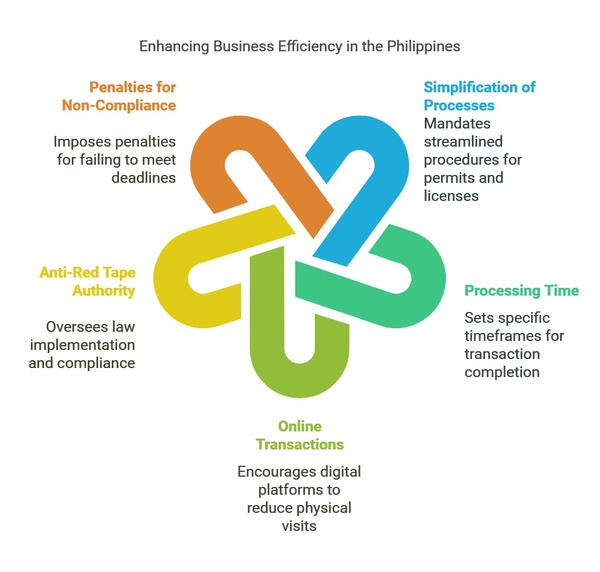Ease of Doing Business and Efficient Government Service Delivery Act of 2018
Republic Act No. 11032
Apple Music
click on the image to start!
Republic Act No. 11032 (Ease of Doing Business and Efficient Government Service Delivery Act of 2018)
Definition
Republic Act No. 11032, also known as the Ease of Doing Business and Efficient Government Service Delivery Act of 2018, is a Philippine law that streamlines government procedures to enhance the ease of doing business in the country. It amends Republic Act No. 9485, or the “Anti-Red Tape Act” of 2007, and introduces stricter measures to address inefficiencies in government service delivery. The Act emphasizes the government’s commitment to promoting integrity, accountability, and proper public affairs and property management.Purpose
This Act aims to:
1. Streamline government processes: Minimize delays by simplifying workflows.
2. Enhance transparency: Empower citizens and businesses to track transactions and ensure accountability.
3. Promote ease of doing business: Improve the Philippines' global competitiveness in attracting investors and facilitating trade.
4. Minimize corruption: Reduce discretionary authority in public offices, which may lead to inefficiencies and graft.Scope
The Act applies to all government offices and agencies, including local government units (LGUs), government-owned or -controlled corporations, and other government instrumentalities, whether located in the Philippines or abroad, that provide services covering business and non-business-related transactions (e.g., permits, licenses, clearances).
Key Provisions
1. Standardized Processing Times
RA 11032 establishes specific timeframes for processing applications and requests to eliminate delays:
• Simple Transactions: Must be completed within 3 working days.
• Complex Transactions: Must be completed within 7 working days.
• Highly Technical Transactions: Must be completed within 20 working days.
• If these deadlines are not met, the application is deemed automatically approved or the request is automatically extended.2. Simplified Business Processes
To make it easier for businesses to start and operate, the law mandates:
• Unified Business Application Form: A single form to be used for business permit applications and renewals.
• Business One-Stop Shop (BOSS): LGUs must establish a centralized location for business-related transactions, allowing applicants to process multiple permits and licenses in one venue.
• Automation: Within three years, LGUs are required to automate their business permitting systems to reduce processing times and improve accessibility.3. Zero Contact Policy
Except during the preliminary assessment of the request and evaluation of the submitted requirements, no government officer or employee shall have any contact, in any manner, unless strictly necessary, with any applicant or requesting party concerning an application or request. This is to reduce the risk of corruption.4. Anti-Red Tape Authority (ARTA)
ARTA is a regulatory and enforcement body created under RA 11032 to:
• Oversee the implementation of the law.
• Ensure compliance by government agencies.
• Address complaints against non-compliant offices.
• Provide assistance in process reengineering to streamline operations.
• Impose penalties for violations.Functions of ARTA:
1. Conduct audits and inspections of government processes.
2. Investigate and prosecute violators of RA 11032.
3. Set performance benchmarks for government services.5. Anti-Red Tape Unit in the Civil Service Commission (CSC)
The Anti-Red Tape Unit in the Civil Service Commission (CSC) will use the Report Card Survey (RCS), in coordination with the Philippine Statistics Authority (PSA), to monitor government agencies' compliance with the Ease of Doing Business Act. The unit will address complaints about non-compliance and inefficiencies, using RCS findings to improve service delivery and human resource programs across government agencies.6. Citizen's Charter
As mandated by the Act, every government agency must create, regularly update, and publicly display a Citizen's Charter that ensures transparency, eliminates guesswork, and minimizes opportunities for corruption.This charter includes:
• A step-by-step guide for availing each service.
• Complete lists of requirements for applications or requests.
• Official fees and applicable charges.
• Responsible personnel for every process stage.
• The maximum time needed to process a request.
• Complaint mechanisms for reporting inefficiencies.7. Online Systems
RA 11032 emphasizes the use of technology to facilitate service delivery. The Department of Information and Communications Technology (DICT) is tasked with creating an online portal for business registration and a databank to provide government agencies access to business information, reducing the need for redundant submissions:
• Central Business Portal (CBP): A platform where businesses can register and obtain licenses, permits, and clearances online.
• Philippine Business Databank (PBD): An integrated database allowing government agencies to verify business information without requiring applicants to resubmit the same documents repeatedly.
Implementation Mechanisms
- Feedback and Complaint MechanismsCitizens can report inefficiencies, delays, or corrupt practices through:
• ARTA’s hotline.
• Online portals and email.
• Feedback stations in government offices.
• Complaints are monitored, and violators are investigated promptly.- Monitoring and Performance ReviewsARTA conducts regular inspections and audits to ensure compliance. Agencies are required to submit periodic reports detailing improvements and compliance with the law.Benefits of RA 11032 for Businesses and Citizens:
1. For Businesses:
• Reduces the cost and time for securing permits and licenses.
• Creates a predictable and transparent business environment.
• Attracts more investments due to improved ease of doing business.2. For Citizens:
• Improves access to efficient government services.
• Empower citizens to report inefficiencies and hold public officials accountable.
• Enhances trust in government institutions.
Penalties
Violations:
• Failure to process transactions within the prescribed time.
• Refusal to accept applications without valid grounds.
• Imposing unauthorized additional requirements.
• Deliberately delaying processing.
• Soliciting or accepting bribes.Penalties for Non-Compliance:
1. First Offense:
• Six months suspension.2. Second Offense:
• Dismissal from service.
• Perpetual disqualification from holding public office.
• Forfeiture of retirement benefits.3. Criminal Liabilities:
• Imprisonment of 1-6 years.
• Fines ranging from ₱500,000 to ₱2,000,000.
Conclusion
The Republic Act No. 11032, known as the Ease of Doing Business and Efficient Government Service Delivery Act of 2018, is a cornerstone policy designed to transform and address long-standing issues of red tape, corruption, and insufficiency in the Philippine Government. By streamlining processes, introducing advanced solutions, and holding public officials accountable, it aims to create a more conducive environment for globally competitive businesses. Hence, improving overall service delivery for Filipino citizens.
Diagram


